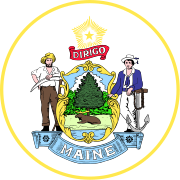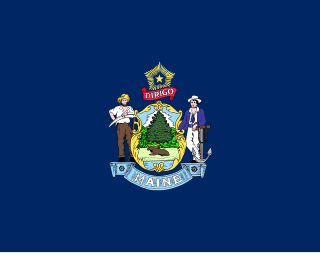
Bradbury Mountain State Park is a public recreation area in the town of Pownal, Cumberland County, Maine, managed by the Department of Agriculture, Conservation and Forestry. The state park covers 730 acres (300 ha).
Same-sex marriage has been legally recognized in the U.S. state of Maine since December 29, 2012. A bill for the legalization of such marriages was approved by voters, 53-47 percent, on November 6, 2012, as Maine, Maryland and Washington became the first U.S. states to legalize same-sex marriage by popular vote. Election results were certified by the Maine Secretary of State's office and the Governor of Maine on November 29.
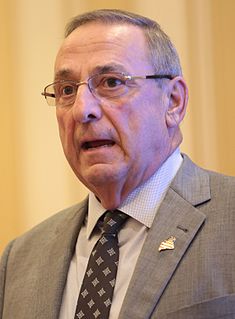
Paul Richard LePage is an American businessman and politician who was the 74th Governor of Maine, from 2011 to 2019. A member of the Republican Party, LePage served two terms as a city councilor in Waterville, Maine, before being elected Mayor of Waterville in 2003, serving until 2011.
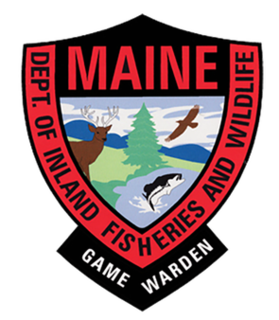
The Maine Warden Service is a police agency in the United States State of Maine responsible for the enforcement of fisheries and wildlife laws, and the coordination of search and rescue in wilderness areas of the state. Operationally part of Maine's Department of Inland Fisheries and Wildlife, it is the oldest conservation law enforcement agency in the United States.

Maine Question 1 was a voter referendum on an initiated state statute that occurred November 6, 2012. The title of the citizen initiative is "An Act to Allow Marriage Licenses for Same-Sex Couples and Protect Religious Freedom". The question that appeared on the ballot was: "Do you want to allow the State of Maine to issue marriage licenses to same-sex couples?"

The 2014 Maine gubernatorial election took place on November 4, 2014, to elect the governor of Maine. Incumbent Republican governor Paul LePage ran for re-election to a second term in office, against sitting congressman from the second district, Mike Michaud, and second-place finisher from the 2010 gubernatorial election, attorney Eliot Cutler. The primary elections were held on June 10, 2014.

Hirundo Wildlife Refuge is protected area covering 2,402 acres (972 ha) along Pushaw and Dead streams in Penobscot County, Maine. The refuge was founded in 1965 by Oliver Larouche from his parent's 3 acres (1.2 ha) camp. The refuge was donated as a trust to the University of Maine in 1983 by Larouche and his wife, June. The refuge is a living laboratory where current and past scientific research has been conducted. Hirundo is just downstream of Pushaw Lake and includes part of the Caribou Bog wetland complex, which is one of the largest wetlands in Maine. The refuge is also the site of the National Register-listed Hirundo Site, a prehistoric Native American habitation site with evidence of 4,500 years of occupation.

Camden Hills State Park is a 5,710-acre (2,310 ha) public recreation area overlooking Penobscot Bay in the town of Camden, Knox County, Maine. The state park features multi-use trails to Mount Battie, Mount Megunticook, and other scenic locales. The park is managed by the Maine Department of Agriculture, Conservation and Forestry.

Moose Point State Park is a day-use public recreation area overlooking Penobscot Bay in Searsport, Maine, located off U.S. Route 1 near the Belfast town line. The state park features panoramic views, hiking trails, tidal pools, and picnicking facilities.

Fort Point State Park is a public recreation area with historic features that overlooks Penobscot Bay from the easternmost tip of Cape Jellison in the town of Stockton Springs, Maine. The state park's 156 acres (63 ha) feature the Fort Point Light and the site of historic Fort Pownall. The park offers hiking trails, picnicking, and fishing.

The 2018 Maine gubernatorial election took place on November 6, 2018, to elect the next Governor of Maine. It occurred along with elections for the U.S. Senate, U.S. House, and other state and local elections. Incumbent Republican Governor Paul LePage was term limited and could not seek reelection to a third consecutive term in office.

Maine Question 1, "An Act To Strengthen the Maine Clean Election Act, Improve Disclosure and Make Other Changes to the Campaign Finance Laws", was a citizen-initiated referendum measure in Maine, which appeared on the November 3, 2015 statewide ballot. As the Maine Legislature did not exercise its ability to pass the bill on its own, it was placed on the ballot and approved by Maine voters.

Maine Question 5, formally An Act to Establish Ranked-Choice Voting, is a citizen-initiated referendum question that qualified for the Maine November 8, 2016 statewide ballot and was approved by a margin of 52% to 48%. It would change how most Maine elections will be conducted from a plurality voting system to a ranked-choice voting system. It appeared on the ballot along with elections for President of the United States, Maine's two U.S. House seats, the legislature, five other ballot questions, and various local elections. Maine would be the first state to use such a system for its statewide elections for governor and U.S. Senate if implemented.

Maine Question 3, formally An Act to Require Background Checks for Gun Sales, was a citizen-initiated referendum question that appeared on the Maine November 8, 2016 statewide ballot. It sought to require a background check for virtually all gun transfers in Maine, with some exceptions. As the Maine Legislature and Governor Paul LePage declined to enact the proposal as written, it appeared on the ballot along with elections for President of the United States, Maine's two United States House seats, the Maine Legislature, other statewide ballot questions, and various local elections.

Maine Question 2, formally An Act to Establish The Fund to Advance Public Kindergarten to Grade 12 Education, was a citizen-initiated referendum question that appeared on the Maine November 8, 2016 statewide ballot. It sought to increase state aid to public schools by instituting a surcharge of 3% on Maine income taxes for those with income above $200,000 a year. As the Maine Legislature and Governor Paul LePage declined to enact the proposal as written, it appeared on the ballot along with elections for President of the United States, Maine's two U.S. House seats, the Legislature, and various local elections.
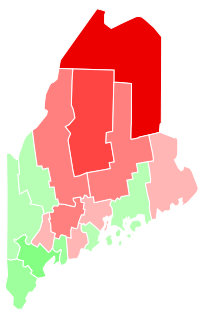
Maine Question 1, formally An Act to Legalize Marijuana, is a citizen-initiated referendum question that qualified for the Maine November 8, 2016 statewide ballot. It was qualified for the ballot after a Maine Superior Court judge ordered that petitions rejected by the Maine Secretary of State be reconsidered. The proposal seeks to legalize the recreational use of marijuana in Maine for those over the age of 21, and institute a 10 percent tax on its sale. As the Maine Legislature and Governor Paul LePage declined to enact the proposal as written, it will appear on the ballot along with elections for President of the United States, Maine's two U.S. House seats, the Legislature, other statewide ballot questions, and various local elections.

Maine Question 2, formally titled "An Act To Enhance Access to Affordable Health Care", is a citizen-initiated ballot measure that has qualified for the November 7, 2017 statewide ballot. It seeks to expand Medicaid eligibility under the terms of the Affordable Care Act, something which has been vetoed six times by Maine Gov. Paul LePage.

Maine Question 1, formally An Act To Allow Slot Machines or a Casino in York County, was a citizen-initiated referendum question that appeared on the November 7, 2017, statewide ballot in Maine. It sought to award a license for the construction and operation of a casino in York County, Maine by a qualified entity as spelled out in the proposed law, with tax revenue generated by the casino to go to specific programs. The wording of the proposed law effectively permitted only one company, Capital 7, to be awarded the license. The ballot measure was defeated, with 83% of voters opposing it.

Maine Question 1 is a citizen-initiated referendum that appeared on the November 6, 2018 statewide ballot. It sought to implement a tax on higher incomes in Maine to fund in-home health care services for elderly and disabled Mainers, as well as to create a government board to administer the funds. The vote coincided with general elections for governor, U.S. Senate, U.S. House, the Maine Legislature, and other local elections. It qualified for the ballot due to supporters collecting signatures from registered Maine voters.
